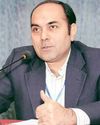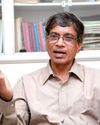How a sarkari city overtook Mumbai as a business centre

Anand Kumar, from Palwal, a small town in Haryana, had gone to bustling Bombay in the late 1980s as a teenager in search of work. “I had thought I’d drive a taxi or something, it would help me set up a base, and I would be able to make a comfortable living in a few years,” says Anand Kumar, now 42. Those dreams were short-lived. Housing was unaffordable, and life was a grind he could not take. In no more than a couple of years, he went to Delhi – some 125 km from his hometown – and set up a tailoring shop in Lajpat Nagar. He has a house in the Badarpur area, where he lives with his wife and three children. “I went to Delhi. It was much more affordable. And there’s no looking back.”
Anand Kumar’s story is typical of a change that oxford economics, a leading macro economic research group, took note of: Delhi edged out Mumbai in the group’s ranking of the top 50 metros. In 2015, Mumbai (including Navi Mumbai, Thane, Vasai-Virar, Bhiwandi and Panvel) had a GDP of $368 billion; and Delhi NCR (including Gurgaon, Faridabad, Noida and Ghaziabad) was ahead by $2 billion with a GDP of $370 billion. ranking-wise Mumbai was 31st, and Delhi 30th. Moreover, oxford economics forecasts that in 2030, Delhi’s GDP will be $1,040 billion and that of Mumbai $930 billion.
Currently, it’s a small difference: $2 billion. As is to be expected, Maharashtra chief minister Devendra Fadnavis and other politicians refuse to make much of it. But the projection for 2030 is a confirmation of what has long been perceived: the buzz is no longer in Mumbai, but in Delhi.
هذه القصة مأخوذة من طبعة January 1, 2017 من GovernanceNow.
ابدأ النسخة التجريبية المجانية من Magzter GOLD لمدة 7 أيام للوصول إلى آلاف القصص المتميزة المنسقة وأكثر من 9,000 مجلة وصحيفة.
بالفعل مشترك ? تسجيل الدخول
هذه القصة مأخوذة من طبعة January 1, 2017 من GovernanceNow.
ابدأ النسخة التجريبية المجانية من Magzter GOLD لمدة 7 أيام للوصول إلى آلاف القصص المتميزة المنسقة وأكثر من 9,000 مجلة وصحيفة.
بالفعل مشترك? تسجيل الدخول

the trump phenomenon
how the 2016 election exposed the us underbelly.

chinnamma is not amma
sasikala may have become the leader of the aiadmk, but she is a far cry from j jayalalithaa, who towered over tamil nadu politics like a colossus.

sakshi malik
sakshi malik is the first indian female wrestler to bag an olympic medal. the 24-year-old comes from mokhra village of rohtak, haryana. she came into the limelight as an international wrestler after she won bronze in the junior world championship in 2010. then, she went on to win silver in the commonwealth games in 2014 and a bronze at the asian wrestling championships in 2015. after rio olympics, malik was conferred india’s highest sporting honour – the rajiv gandhi khel ratna. she is also the brand ambassador of the beti bachao, beti padhao campaign in haryana.

Across The Threshold
A social media campaign aims to bridge gaps between communities by urging people to visit ‘people unlike us’

'How Can An Insurance Firm Promote Death?'
Dr Pankaj Chaturvedi, head and neck cancer surgeon at the Tata Memorial hospital in Mumbai, is a leading antitobacco activist. He joined hands with Sumitra Hooda Pednekar and others to file a PIL in the Bombay high court earlier this year, questioning the staterun insurance firm LIC’s investments in a leading cigarette-maker company. Edited excerpts from an interview with Geetanjali Minhas:

The Wolf And The Lamb
Social injustice and the fate of the university

"Young Dalit Leaders Have Age, Situation On Their Side"
How do you see the rise of the Bhim Army in Uttar Pradesh?During the last assembly elections in UP, it was a common consensus among many [dalit leaders] that we’d give one more chance to Mayawati.

Timely Delivery
A veteran bureaucrat explains how to complete government projects without time and cost overruns.

Cauvery Water Dispute
India’s leading water expert and president of the South Asia Consortium for Inter disciplinary Water Resources Studies, S Janakarajan, wonders why Chennai, a city that receives 1,250 mm rainfall, is called a thirsty city and goes on to explain to Shivani Chaturvedi what went wrong among the southern states that led to a water-war like situation. But, he warns that such a scenario will keep occurring if the government does not come up with a lasting solution.

Case Against Cash
Can you imagine a day without cash?